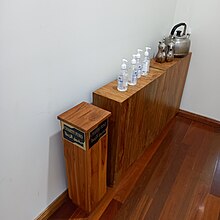
In Mandaeism, zidqa (Classical Mandaic: ࡆࡉࡃࡒࡀ) refers to alms or almsgiving. Mandaean priests receive regular financial contributions from laypeople, since priesthood is typically a full-time occupation. Zidqa is also offered to the poor and needy.
In Mandaean scriptures, including the Qulasta, the term kana ḏ-zidqa is used to refer to alms collection. The word kana is originally used to refer to vessels for storing water or milk, and is of Akkadian origin.
Other uses
The Mandaic term zidqa brika (literally "blessed oblation") refers to a ritual meal blessed by priests. An early self-appellation for Mandaeans is bhiri zidqa, meaning 'elect of righteousness'.
See also
- Charity (Christian virtue)
- Zakat in Islam
- Sadaqah in Islam (Arabic cognate)
- Tzedakah in Judaism (Hebrew cognate)
- Dāna in Hinduism
References
- Gelbert, Carlos (2011). Ginza Rba. Sydney: Living Water Books. ISBN 9780958034630.
- Drower, Ethel Stefana. 1937. The Mandaeans of Iraq and Iran. Oxford At The Clarendon Press.
- Nasoraia, Brikha H.S. (2021). The Mandaean gnostic religion: worship practice and deep thought. New Delhi: Sterling. ISBN 978-81-950824-1-4. OCLC 1272858968.
- Drower, E. S. (1959). The Canonical Prayerbook of the Mandaeans. Leiden: E. J. Brill.
- Häberl, Charles (2022). The Book of Kings and the Explanations of This World: A Universal History from the Late Sasanian Empire. Liverpool: Liverpool University Press. doi:10.3828/9781800856271 (inactive 1 November 2024). ISBN 978-1-80085-627-1.
{{cite book}}: CS1 maint: DOI inactive as of November 2024 (link) - Rudolph, Kurt (7 April 2008). "MANDAEANS ii. THE MANDAEAN RELIGION". Encyclopaedia Iranica. Retrieved 8 January 2022.
This Mandaeism-related article is a stub. You can help Misplaced Pages by expanding it. |

